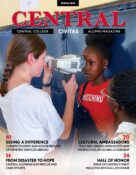The magazine Paul Richardson ’84 edits used to be propaganda for our most dangerous enemy. Now, it’s a popular cultural magazine devoted to the world’s largest country, and the only English magazine in the world focused exclusively on Russian politics, culture, history and social issues—which happen to be Richardson’s biggest passions. Passions that were first kindled during his years at Central College.
Richardson’s company, run out of Vermont, is called Russian Information Services (RIS), and it publishes books, maps and an annual calendar devoted to Russia. The heart of the business is the magazine Russian Life, which has a circulation of about 10,000 and comes out six times a year. It began in 1957 as Soviet Life and was published by Novosti, the foreign press arm of the Soviet government. (The U.S. had a corresponding publication, called America Illustrated, in the U.S.S.R.)
Soviet Life folded when the Soviets went kaput, but a joint venture between a U.S. company and Novosti resurrected it as Russian Life in 1993. The publication hobbled along for two years, when the joint venture sold it to RIS. “I said, ‘How hard could this be? It’s just a magazine,’” recalls Richardson.
Today, Russian Life is the flagship of the business. Richardson isn’t surprised, despite the media’s constant dire warnings about the decline in reading. “There is a hard core of Americans that have an interest in the world beyond our shores,” he says. “Among them, there is a certain fascination with Russia because of our shared history.”
Richardson’s own history is a huge source of his interest in Russia. In 1982, while studying abroad in Wales, he got the chance to spend a week in Moscow and St. Petersburg on a trip led by Professor Malcolm Gilbert at Trinity College, where Richardson was attending classes with Central’s program. While in St. Petersburg, he and other students met with a black marketeer, and Richardson swapped his tattered down jacket for two fur hats.
The trip touched off a lifelong passion. “Back then, Russia was so foreign and different from any of the other history or politics we studied,” Richardson says. “I was also interested because Russia was our enemy and understanding them could mean bridging our two cultures and seeking a solution.”
Richardson returned to campus with a new direction for his life. The political science major went on to Indiana University to earn a master’s in political science and a Russian Area Studies certificate. Degree in hand, he hopped on a plane to Moscow, where he became deputy director of one of the first joint Soviet-Western ventures—a publishing company with 40 employees. He was the only foreigner.

In 1989, just two years before the Soviet Union dissolved, the country was like the “wild west,” says Richardson. Economic reforms threw the market and the populace into disarray. “To be there at a time when the Berlin Wall was coming down in Germany, to be working right alongside Russians, learning about their culture, was fascinating,” he says.
After 18 months, Richardson returned to the U.S. and settled in Vermont, where he established RIS with a partner who has since retired. In addition to running the company and the magazine, Richardson spends his spare time on other writing projects.
In 2011, he published the novel “Russian Rules,” a thriller involving a hapless American ex-pat caught up in a nasty plot involving loose nuclear materials. Richardson says a key incident from the novel—when the protagonist gets a wrong-number call on his cell, ordering him to make a hit—was inspired by a wrong-number phone call Richardson once got late at night from someone speaking Russian, a strange coincidence.
 In 2012, Rodale published Richardson’s second book, “Running is Flying,” a collection of aphorisms and meditations devoted to the sport. An athlete in high school and college, Richardson began running seriously again seven years ago, after a close friend had a health scare. “When I run, my mind just wonders in weird directions,” he says. “I would come back and write down my ideas, and after a while I’d collected enough for a book.”
In 2012, Rodale published Richardson’s second book, “Running is Flying,” a collection of aphorisms and meditations devoted to the sport. An athlete in high school and college, Richardson began running seriously again seven years ago, after a close friend had a health scare. “When I run, my mind just wonders in weird directions,” he says. “I would come back and write down my ideas, and after a while I’d collected enough for a book.”
“Running is Flying” has illustrations to accompany each thought, such as “A non-runner will never understand the joy running gives you. Or the pain.” and “Never trust a runner with clean shoes.”
From Russia to running, Richardson has found satisfaction and success through his writing. And it all began with a trip to Wales through Central College.














To encourage serious, intellectual discourse on Civitas, please include your first and last name when commenting. Anonymous comments will be removed.
Comments are closed.